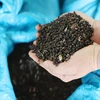Sugar inventories in the first quarter of this year rose 50 percent over last year to 600,000 tonnes, while prices at processing plants fell to the lowest level in five years.
Statistics from the Ministry of Agriculture and Rural Development showed that by the end of March, the sugar sector produced 1.17 million tonnes of sugar, an increase of about 120,000 tonnes against the same period last year.
The ministry estimated that sugar output this year would reach 1.6 million tonnes, while domestic market would consume 1.4 million tonnes, resulting in sugar supplies being 200,000 tonnes larger than demand this year.
In addition, as part of the country's World Trade Organisation's commitment, Vietnam would have to import 77,000 tonnes of sugar. The import amount, together with sugar inventories from the previous years and illegal importing of sugar across borders, would leave the nation's sugar stocks at 400,000 tonnes.
Ha Huu Phai, head of the Vietnam Sugar and Sugarcane Association (VSSA)'s Hanoi Branch, was quoted by Nong Thon Ngay Nay (Countryside Today) as saying that sugar selling prices have been continuously decreasing, causing difficulties for the industry.
For instance, sugar prices at plants were reduced from 18,000-19,000 VND (0.86-0.90 USD) per kilo in 2011 to 14,000-15,000 VND (0.67-0.71 USD) per kilo in 2013.
Further, in the first three months of 2014 sugar prices saw a sharp decline to 12,000-13,000 VND (0.57-0.62 USD) per kilo, while illegally imported sugar was selling for only 11,000 VND (0.52 USD) per kilo. Also, sugar prices on the world market fell from 800 USD to 465.9 USD per tonne.
Phai said slower consumption and larger stockpiles have caused sugar processing plants to cease operating, such as Long My Phat Sugarcane Plant in southern Hau Giang province and Kien Giang Sugarcane Plant. This has pushed sugar farmers into a corner, as they had been unable to sell their sugar. Further, several farmers have had to shift to growing other crops.
Some large plants, such as Lam Son Sugar Corporation, also suffered losses. It processed some 12,000 tonnes of sugar in the first quarter of the year, meeting only 10 percent of the year's target, while processing 50,000 tonnes in the same period last year.
Phai said the Government should allow the sector to export sugar to China, as a solution to reduce stockpiles.
The association forecast that sugar output for the 2013-14 crop in China would be 14.2 million tones, while its domestic demand would be 16.3 million tonnes.
VSSA proposed to export 300,000-400,000 tonnes this year, in addition to meeting its export quota of 200,000 tonnes.
The association also asked the Government to use funds for reinvestment in the sector by supporting sugar farmers and developing sugar planting areas.
The association requested that the ministries of Finance and Industry and Trade apply zero tax on sugar imports by 2018, instead of 2015 as planned, to help processing plants set aside more time to prepare for competition from foreign countries.
Ministry of Industry and Trade officials, meanwhile, said it would allow an additional 200,000 tonnes of sugar to be exported if the sector fulfilled its current quota of 200,000 tonnes.-VNA
Statistics from the Ministry of Agriculture and Rural Development showed that by the end of March, the sugar sector produced 1.17 million tonnes of sugar, an increase of about 120,000 tonnes against the same period last year.
The ministry estimated that sugar output this year would reach 1.6 million tonnes, while domestic market would consume 1.4 million tonnes, resulting in sugar supplies being 200,000 tonnes larger than demand this year.
In addition, as part of the country's World Trade Organisation's commitment, Vietnam would have to import 77,000 tonnes of sugar. The import amount, together with sugar inventories from the previous years and illegal importing of sugar across borders, would leave the nation's sugar stocks at 400,000 tonnes.
Ha Huu Phai, head of the Vietnam Sugar and Sugarcane Association (VSSA)'s Hanoi Branch, was quoted by Nong Thon Ngay Nay (Countryside Today) as saying that sugar selling prices have been continuously decreasing, causing difficulties for the industry.
For instance, sugar prices at plants were reduced from 18,000-19,000 VND (0.86-0.90 USD) per kilo in 2011 to 14,000-15,000 VND (0.67-0.71 USD) per kilo in 2013.
Further, in the first three months of 2014 sugar prices saw a sharp decline to 12,000-13,000 VND (0.57-0.62 USD) per kilo, while illegally imported sugar was selling for only 11,000 VND (0.52 USD) per kilo. Also, sugar prices on the world market fell from 800 USD to 465.9 USD per tonne.
Phai said slower consumption and larger stockpiles have caused sugar processing plants to cease operating, such as Long My Phat Sugarcane Plant in southern Hau Giang province and Kien Giang Sugarcane Plant. This has pushed sugar farmers into a corner, as they had been unable to sell their sugar. Further, several farmers have had to shift to growing other crops.
Some large plants, such as Lam Son Sugar Corporation, also suffered losses. It processed some 12,000 tonnes of sugar in the first quarter of the year, meeting only 10 percent of the year's target, while processing 50,000 tonnes in the same period last year.
Phai said the Government should allow the sector to export sugar to China, as a solution to reduce stockpiles.
The association forecast that sugar output for the 2013-14 crop in China would be 14.2 million tones, while its domestic demand would be 16.3 million tonnes.
VSSA proposed to export 300,000-400,000 tonnes this year, in addition to meeting its export quota of 200,000 tonnes.
The association also asked the Government to use funds for reinvestment in the sector by supporting sugar farmers and developing sugar planting areas.
The association requested that the ministries of Finance and Industry and Trade apply zero tax on sugar imports by 2018, instead of 2015 as planned, to help processing plants set aside more time to prepare for competition from foreign countries.
Ministry of Industry and Trade officials, meanwhile, said it would allow an additional 200,000 tonnes of sugar to be exported if the sector fulfilled its current quota of 200,000 tonnes.-VNA



















